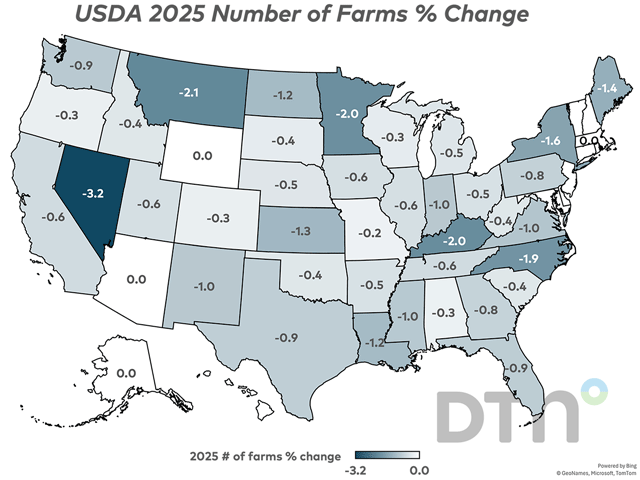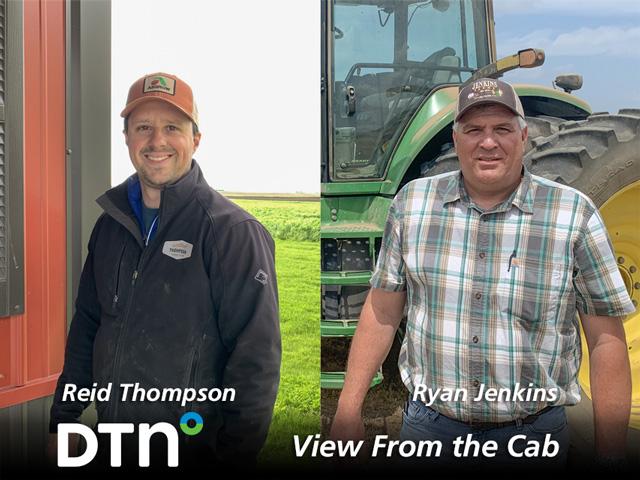View From the Cab
When Nature Calls
DECATUR, Ill. (DTN) -- The old childhood ditty "rain, rain go away" is a constant for Ryan Jenkins and Reid Thompson this week.
Jenkins has been wallowing in water after Hurricane Sally and now Tropical Storm Beta have turned what was a promising bumper cotton and peanut crop into a muddy mess. "It has been raining and we've barely seen the sun since Sally hit," said Jenkins, who farms near Jay, Florida.
Meanwhile, Reid Thompson is also wishing away rain as he begins to open fields on his Colfax, Illinois, farm. He spent August thirsting for a rain before the skies opened up with a solid drink in early September.
"We sure don't have anything to complain about here when I consider what's happening in other parts of the country. However, I don't need rain now. I need drying weather. The crop looks drier than it really is," Thompson said.
Everything about 2020 seems to be on edge -- so much so, that many farmers are afraid to imagine what shoe might drop next. If buckets of rain weren't enough, Jenkins was standing in the implement dealership when an earthquake left him quaking.
"We don't get those very often, and while it didn't do any real damage, it got our attention," he said.
"And, I'm not making this up -- my dog, Hank, got run over on the highway by our shop last week," Jenkins said. "Thank goodness he's going to be fine and is just skinned up and sore, because losing him might have put us over the edge."
Jenkins and Thompson are participating in DTN's View From the Cab series, a weekly report about crops and farm life. Too much rain and too little rain have been a yo-yo thread throughout the season.
On-farm safety is also a priority, and Thompson and Jenkins give a shoutout during National Farm Safety to the importance of keeping calm -- no matter how crazy or busy life might seem.
REID THOMPSON -- COLFAX, ILLINOIS
The sound of corn tumbling and striking steel provided a backdrop for Reid Thompson's crop report this week. The farm's new grain drying system was getting a trial run on Monday.
A new conveyor belt and a circle drive has him feeling like Christmas came early this year. While most of his corn was still testing over 25% moisture this week, he was able to find some drier spots to harvest to boot up the grain system and work out the kinks.
The tops are starting to break out of corn, and cool weather was slowly drying the crop. Thompson knew of only one neighbor harvesting at any scale, and he was taking out 110-day corn that was planted April 20, and it was still at 24% moisture.
"My biggest problem is I've got some high-moisture corn and have to dry it a little with cheap fuel," Thompson said. "When I see what Ryan (Jenkins) is going through in Florida, I'm feeling pretty fortunate."
DTN Senior Ag Meteorologist Bryce Anderson said central Illinois has a mild, dry pattern through the next two weeks. "There may be some light rain Sunday, Sept. 27, but it will be less than one-quarter inch," Anderson said.
On Sept. 20, USDA NASS pegged Illinois corn as 4% harvested -- lagging the 11% five-year average for this time of year. Soybeans were estimated at 1% harvested. "We are a couple of weeks out on soybeans," Thompson said.
P[L1] D[0x0] M[300x250] OOP[F] ADUNIT[] T[]
While the most recent Crop Progress report rated Illinois corn as 73% good to excellent, Thompson said the crop is "dirty."
"Red dog," or an abundance of red bees' wings, is already being noted. "I'm not overly concerned about it, but we will need to pay attention and core bins -- or we could have some problems, even though it is only September," he noted.
There are also reports of black mold beginning to cover corn leaves and stalks. These are saprophytic fungi, or microorganisms that feed on dead plant tissue, and are not uncommon when a dry period is followed by rainfall. The molds do not show up in harvested grain. However, the clouds of black mold can look like smoke when combines are running, and individuals with allergies or respiratory problems are advised to wear dust masks.
N95 masks are scarce this year as the pandemic depleted supplies. Thompson was hoping his supply holds out and goes into the season with new air filters on the combine.
"The biggest thing we need to remember as farmers this time of year is to slow down. We're in a hurry, but an accident and even smaller things such as a grain spill or messing up a weight measurement are more time-consuming," he noted.
The farm does a lot of loading of trucks along roadsides, and Thompson, who does a lot of the trucking, has started wearing high-visibility shirts.
"Stay out of the bins is an order on this farm," he added.
RYAN JENKINS -- JAY, FLORIDA
Mention tropical depressions and Ryan Jenkins is apt to tell you they are appropriately named. It's hard not to be disheartened when a single weather event dumps from 15 to 30 inches of rain on crops that had buckets of yield potential.
"It's not looking too good and definitely not looking like I hoped it would," Jenkins said. "The cotton is rotting -- you can smell it as you drive by. The peanuts need to be dug soon or we will lose them."
Hurricane Sally made landfall near Gulf Shores, Alabama, as a Category 2 storm Sept. 16 -- remarkably, it was 16 years to the day since Hurricane Ivan hit in nearly the same place. Sally's creeping progress meant volumes of water dropped in the Panhandle and southwestern Alabama, where Jenkins farms. His acreage is fairly spread out, but not a field was spared, he said.
Tropical Storm Beta followed on the heels of Sally, adding more drizzling moisture to the misery. "We just really need drying weather so we can salvage what is left," Jenkins said.
Bryce Anderson, DTN meteorologist, explained that a tropical storm has sustained wind speeds of 39 to 74 mph. A hurricane has a sustained wind speed of at least 74 mph.
"The Florida Panhandle does have showers in the forecast through this week with a total rainfall of around 1 inch or a little more," Anderson reported. "The Panhandle will get some activity from the Tropical Storm Beta system on the Texas coast, but not the heaviest rainfall. Guidance has a drier pattern during next week."
Cotton bolls had just begun to open when Sally showed up. The seed in open bolls is sprouting and will not be harvestable, Jenkins said. "Cotton is steadily trying to open, and those bolls that get lighter rains like we're seeing now, where there is never any sunshine, will hardlock and we won't be able to harvest those bolls," he said. In hardlock cotton, the boll opens, but the fiber does not fluff out. Instead, it remains compact within the boll -- reducing yields because cotton pickers cannot harvest the fiber within the hardlocked bolls. "Early cotton has been hit the hardest with storm damage. There may be some hope for later-planted cotton, but much of it is laying down, and the picker works best when the plant is upright. Bolls that are touching the ground will likely rot off," he said.
The sandy nature of the soils in this region helps drying. Jenkins tried digging some peanuts on Tuesday, but things were still too wet. He's nervous about waiting because peanuts left too long in the soil simply begin to drop off. "The clock is ticking. If I don't get started digging soon, I'll lose every one of them," he said.
Last week, Jenkins hosted Florida Commissioner of Agriculture and Consumer Services Nikki Fried and 40 other farmers at his farm.
Hurricane insurance was available this year for the first time, and Jenkins participated in that program. However, hurricane-force winds from a named system in your county or the county adjoining you are the qualifying factor to establish loss.
"I'm advocating for excessive rainfall as a qualifying factor, and I would like to see the program also include tropical storms. A tropical storm that stalls out and dumps a bunch of rain can do as much or more damage as a hurricane," he maintained.
"It was good to actually take her (Fried) to the field and show what we are up against. There will be diseases and other problems that come as a result of the damage we are seeing now. We don't know what our grades will be on cotton or peanuts. Until we get harvested and graded, we won't know our total loss for a while," Jenkins added.
Three generations of family work in the farming enterprise -- including sons that are of college and high school age. "I don't hide anything we are going through," he said.
"This is a good lesson in patience. A good lesson in faith. A good lesson in perseverance. And, a good lesson in sometimes things are out of your control, no matter how good of a job you've done.
"I want them to see that, no matter what, you can't stop trying. You have to keep putting one foot in front of the other," he said.
Jenkins said that there have been other hurricanes with greater damage to property and life. He also noted that many other farmers in other parts of the country are dealing with other natural disasters.
"I think the whole farm economy needed a good harvest and good weather and good prices this year. It's hard to get this close to harvest and lose this much," he said.
These kinds of events have a long arm in other ways, too. Now, because of weather, the peanut season is compressed, and producers are lumped into doing similar operations instead of being spread out.
"That creates a bottleneck at the buying point with everyone trying to get trailers and dump at the same time," he noted.
Accidents are more likely when harvest becomes a push. Years spent as an emergency medical paramedic and on a Life Flight helicopter have made Jenkins especially cautious because he's seen so much.
"The average person's reaction when they see someone in need or hurt, for example, is to run to them as fast as possible. In fact, the proper procedure is to walk with purpose -- evaluating the situation while being cognizant of your surroundings.
"It is the same in farming. Our emergency environment is to get our crop out. It takes a concentrated thought to slow down and think about safety," he said.
Tiredness and stress don't help the scenario. "If you are so tired you can't do simple calculations in your head or you really have to think about things that usually roll right off your tongue -- those are signs you've gone too far and it is time to take a break," he said.
Pamela Smith can be reached at pamela.smith@dtn.com
Follow her on Twitter @PamSmithDTN
(c) Copyright 2020 DTN, LLC. All rights reserved.




